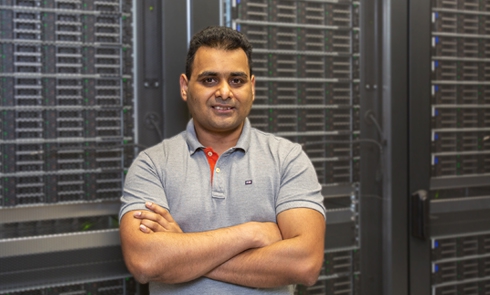“Creating without a goal it is pure art.”
Press & Communications
“Creating without a goal it is pure art.”

Bright mind: Ayan Paul was born in Kolkata, India. Today, the 39-year-old particle physicist lives in Berlin – but with his thoughts and ideas, he’s always on the move.
Ayan Paul, do your thoughts actually constantly swirl around Big Data?
Sometimes my mind won’t shut itself off. But I also don’t aim for it to shut off. Rethinking things is for me like having a conversation. Data explains to us a lot more than we can see.
What do you mean by that?
Typically we understand one or two parameters, maybe. We give Yes or No answers, making decisions on the basis of one or two conditions. Data is magic, though. It takes you to places that your brain can’t easily reach. The trick is to take all these complicated datasets and pack them in a number that people can understand.
Give an easy-to-understand example.
People built bridges before they understood Newton's laws. Why? Because they collected data about what works and what doesn't work. They built the first bridge – it collapsed. They built the next one – it was a little better. That’s how we humans have always proceeded. That’s how our development works. We collect data.
Have you always thought that way? Or do you sometimes see something without thinking about data right away?
Of course, I haven’t always thought in such a complex way. But I always asked a lot of questions and was never satisfied with the first answer. That’s how I was brought up. Looking for answers is part of my personality. That’s why I love research: no one resents me for asking questions.
Is there one big question?
Yes, and that is: why am I here? I don't think I’ll find the answer to that in my lifetime. But it is a good question. And it would be good if we understood why we are what we are and what our purpose is.
Is this question also part of your motivation?
Yes, and for two reasons. First, the structural reason – how did we become what we are? This is related to my research as a particle physicist. The second reason relates to our intelligence, which we have little idea of how it works. That’s what brought me to AI, to artificial intelligence. It’s a way to approach the subject: to build a system similar to our own in order to understand ourselves. I’m also working on the structural dynamics of intelligence. Thinking about thinking simply fascinates me.
You describe yourself as a thinker, creator, researcher, physicist – are you also an idealist?
No! Maybe I’d like to be – but I’m also a phenomenologist. That means: data is my starting point. I examine reality. Idealists create lots of things; however, they also do it without a set goal. And that's purely art. I’m not good at it at all – but I think it’s fantastic!
The interview with Ayan Paul was conducted by Christina Mänz.